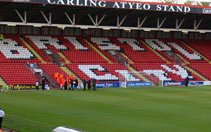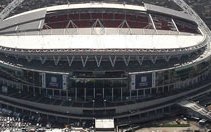Full name: Accrington Stanley
Football Club
Nickname(s): Stanley
Founded: 1968
Ground: Interlink Express Stadium, Accrington
Capacity: 5,057
Accrington Stanley are a football club from Accrington in Lancashire, formed in 1970 in the north-west of England. The previous club of the same name played in the Football League between 1921 and 1962 when they became only the second club to resign from the Football League in mid-season. The town regained a club with league status after 44 years, when they were promoted as champions of the Nationwide Conference on 15 April 2006 [1].
They are not to be confused with Accrington F.C., who were one of the original twelve founder members of the Football League. While Stanley have never been particularly successful, they are generally thought of as a true part of the history of British football, especially that in Lancashire. The team’s name is often invoked as a symbol of British sport’s legion of plucky but hopeless causes (much like British ski-jumping’s ‘heroic failure’ Eddie ‘the Eagle’ Edwards).
Original Club
The first Accrington Stanley club was formed in 1891 as Stanley Villa and adopted the Accrington name in 1895. The club re-formed after the First World War and entered the League in 1921 with the formation of the old Third Division North, along with the other top Northern non-league clubs. In four decades of league football they never managed to achieve promotion from the Third Division. The driving force was Sam Pilkington who helped to secure Peel Park, their original ground. Their best-ever league position was 2nd in that division, in the 1954-55 season and again in 1957-58. Unfortunately, only the top club was promoted at the time, so they never had the chance to compete in Division Two.
In 1960, amid persistent financial difficulties, Stanley were relegated to the recently-formed Division Four. However, they only managed to complete one full season in this division: bankruptcy followed shortly afterwards. On 12 February 1962 Edwin Slinger, the chairman, resigned and revealed that Stanley owed up to £4,000 in unpaid transfer fees and a similar sum to the Inland Revenue. Pilkington, as life vice president, brought in Bob Lord, who persuaded the rest of the board to resign by promising to buy shares, despite his chairmanship of nearby Burnley F.C. Stanley lost their last League match 4-0 away at Crewe on 2 March 1962, but at a creditors meeting shortly after a further £40,000 of unsecured creditors was revealed. A further amount of £458 owed for National Insurance was enough for Lord and Pilkington to decide the draw the line. The club sent a letter of resignation to the Football League even though none of the creditors was threatening to ‘pull the plug’. The resignation was accepted by Alan Hardaker, the League Secretary on 11 March, mid-way through the 1961/62 season.
The role of Bob Lord in refusing, in his capacity as administrator of the bankrupt club, to accept a bailout offer that would have permitted his close competitor to remain afloat is still unforgiven by some.
Revival
In a meeting in the town library in October 1968 the revival was started and in August 1970 the new club played at a new ground, The Crown Ground. Since then, Stanley have clawed their way back up the non-league scene. Eric Whalley, a local businessman, took control of the club in 1995 and started the development of the ground, now renamed the Interlink Express Ground. After relegation in 1999, Whalley appointed John Coleman as manager. Stanley are now competing in the Nationwide Conference, which is the highest level of football outside the Football League. Each season, the winner of the Conference and the winner of playoffs between the next four top teams in the Conference replace the bottom two teams in the Football League.
The club’s recent rise to the Conference level is attributed in part to the windfall of hundreds of thousands of pounds reaped by the sell-on clause in the December 2001 transfer of former Stanley star Brett Ormerod to Southampton F.C., which paid Blackpool F.C. over a million pounds for his contract. Stanley had taken fifty thousand pounds from Blackpool in 1997 with the agreement that Blackpool would pay Accrington a quarter of what they might have received if they in turn transferred Ormerod to another team. The 2002-2003 championship of the Northern Premier League followed quickly on Accrington’s getting the cash.
Accrington Stanley confirmed their place in the Football League on Easter Saturday, 15 April 2006, with a 1-0 win at Woking.
Origin Of Name
There are various theories relating to the origin of the word Stanley in the club’s name. Stanley is the family name of the Earl of Derby and, as major landowners in the northwest of England, their name was attached to streets and pubs. The main theory is that the founders lived in Stanley Street and/or met in a pub named the Stanley Arms in Accrington. In all probability the exact answer will never be know
Lift Share to Accrington
If there is anyone looking to do a car share to home/away matches whether needing a lift or offering one, Please register with our forums and leave your details in the section called ‘Away Match Information’ with the following details and hopefully someone will be able to fulfill your request.
– Name and E-mail
– Where you live (i.e Trowbridge)
– Whether your offering a lift or looking for a lift
– If offering a lift, how far within your geographical location you would travel to pick up or if looking for a lift how far you would travel to meet your lift.



